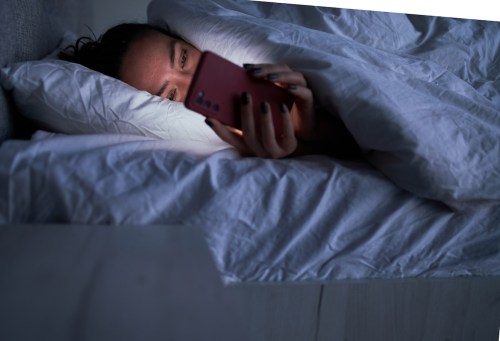Picture this: You’re just wrapping up your nighttime routine and getting ready for a restful night of restorative sleep. This could involve aromatherapy, reading a book, cueing up some white or pink noise, and taking a melatonin supplement to help your body ease into sleepiness. But after you take the supplement and the lights are off, there’s still a glow emitting from your phone. Maybe it’s a push alert from a news outlet, a text from a friend, or a viral TikTok. Whatever the cause, you find yourself awake much later than you planned to be. Did your melatonin fail you? Or might the blue light from your device have rendered the melatonin ineffective?
Experts in This Article
clinical psychologist, sleep specialist, author of The Women’s Guide To Overcoming Insomnia, and Director of Sleep Health at Sleepopolis
Melatonin is a naturally occurring hormone that the body releases to signal it’s time to shift into sleep mode. For people who are deficient in melatonin production or who otherwise want help inducing sleepiness, they may turn to a melatonin supplement. But research has found that using your phone, which gives off blue light, before bed has negative effects on your shut-eye. Part of the reason why is because blue light exposure can delay and suppress our natural production of melatonin. But how does blue light interact with melatonin supplements?
What we know about the relationship between blue light exposure and melatonin supplements
According to experts, current research doesn’t provide clear answers, but available information about blue light and melatonin is telling. “We do know that the blue light would suppress our own melatonin, at least the level that it needs to be at for better sleep, so that part is fairly well-studied,” says Kin M. Yuen, MD, sleep medicine specialist at the University of California, San Francisco’s Sleep Disorders Center. The next component, she adds, of blue light exposure rendering a melatonin supplement less effective isn’t studied, “but we know scrolling through the phone definitely delays sleep.”
With that in mind, it’s a reasonable conclusion that blue light and melatonin supplements aren’t a great combo for your sleep, regardless of how the two may interact, because scrolling delaying sleep may compromise the efficacy of the melatonin supplements.
“We do know that the blue light would suppress our own melatonin, at least the level that it needs to be at for better sleep.” —Kin M. Yuen, MD, sleep medicine specialist
Part of why it’s tough to qualify an interaction between phones and melatonin supplements is because the composition and dosage of what’s on the market varies so widely. Melatonin is classified as a dietary supplement by the Food and Drug Administration (FDA), and supplements aren’t subject to the same regulatory practices as medications.
A 2017 study published in the Journal of Clinical Sleep Medicine found that in a review of 30 supplements from various companies, there was “high variability” of the amount of melatonin each contained compared to what was listed on the label. The melatonin used in clinical studies isn’t the same as what’s available to the public, Dr. Yuen says, so the supplements would need to be studied to answer the question directly.
But, keep in mind that blue light and melatonin—both the supplements and the naturally occurring hormone—have opposite effects: One keeps you awake and alert, the other signals it’s time to wind down. Light has a powerful effect of disrupting your circadian rhythm, and studies have shown that blue light has a particularly strong effect because of its intensity and short wavelength. For this reason, blue light exposure near bedtime bedtime can throw off your internal clock and delay sleep.
Now, let’s pretend that your phone doesn’t emit blue light. Simply engaging with the content it serves you still stands to delay sleep by keeping your eyes and mind active. If you’re looking at something stressful or exciting, that alone can delay your sleep because it is engaging your mind.
How to proceed with great sleep, since blue light exposure and melatonin supplements don’t mix
Even if we don’t have exact answers on how blue light from screens and melatonin supplements interact, experts say we do know about good sleep hygiene (adjusting your behavior during both daytime and nighttime can help) and that not using your phone when you should be sleeping is a good bet for better sleep. “Instead of masking that behavior [with a supplement], wouldn’t it be easier to just put your phone away if you are not in a profession that requires you to be on call 24/7, so you have less disturbed sleep?” Dr Yuen asks.
Furthermore, you might benefit from considering your overall sleep routine before addressing just the isolated relationship between blue light and melatonin supplements. “If you have difficulty falling asleep at night, it’s usually not just one thing that causes it, unless it’s an acute situation,” says neurologist Milena K. Pavlova, MD, director of the Sleep and EEG Testing Centers at Brigham and Women’s Faulkner Hospital and associate professor at Harvard Medical School, citing examples like a death in the family or extreme stress.
To address this, she suggests trying small shifts, like dimming screens on phones and computers and making lifestyle changes, like paying attention to your bedtime and caffeine intake.
Sign Up for Our Daily Newsletter
Get all the latest in wellness, trends, food, fitness, beauty, and more delivered right to your inbox.
Got it, you've been added to our email list.











